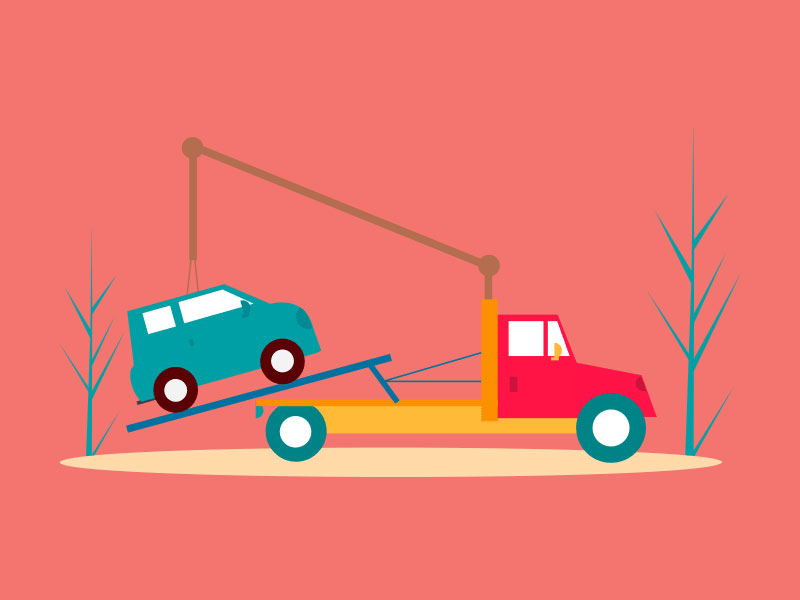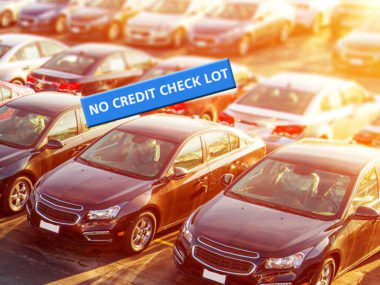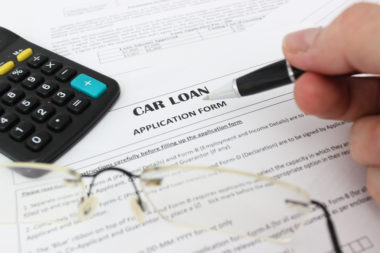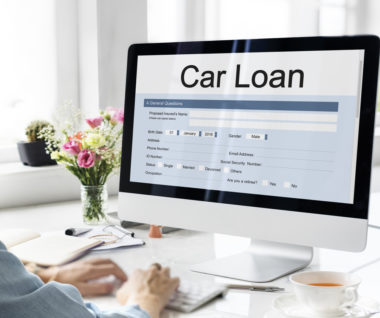
These are challenging financial times for many people. If you’ve fallen behind on your payments, you’re not alone. You may be wondering what your options are for lightening up your debt load.
You may be considering voluntary repossession as a way to unburden yourself of a car loan that you can’t afford, however, you may want to look at your alternatives. As far as your credit is concerned, voluntarily surrendering your car to the lender is almost the same as a traditional repossession.

Table of Contents
The Difference Between a Repossession and Voluntary Surrender
From the bank’s point of view, there is little difference between a voluntary surrender and repossession. Lenders and credit agencies consider these as two routes to the same end. Aside from a few very minor advantages, financial institutions will treat a voluntary surrender the same as any other repossession.
In a practical sense, voluntarily returning the car to the lender can spare you a little discomfort and makes the process more predictable. The advantages include:
- Reducing additional fees
- Preventing inconvenience
- Avoiding embarrassment
When a lender has to send someone to physically repossess your vehicle, they will add any fees associated with the collection of your car to what you owe, so a voluntary repossession can save you some money.
With an involuntary repossession, your family, neighbors, or coworkers may witness the repossession, and you may find yourself suddenly stranded. Repossession teams can show up at any time to take your vehicle after a default. There are very few legal limits on the process.
In some states, there are rules against a breach of peace while taking possession of your car. This includes violent acts. Depending on where you live, this might prevent the repossessor from breaking into a locked building to retrieve the vehicle.
Most repossessions happen in the middle of the night, specifically to avoid dramatic scenes. It’s also usually the easiest time to locate the car since most people are home sleeping.
Certainly, talking to the lender ahead of time and dropping the car off is a less miserable experience, but that is the full extent of the difference. It’s a default on the loan either way.
What Happens After a Voluntary Repossession
After you return your car to the dealership, the process is exactly the same as it is for a regular repossession.
1. The Lender Will Usually Sell the Vehicle
Generally, the lender will sell or auction off the vehicle to recover losses on your loan. They can keep the car, but they usually opt to unload it.
Buy Back Options
The laws in some states require that the lender tell you in advance what they plan to do with your car, and in most states, you will have a window during which you can pay what you owe, plus any repossession fees, and take the car back.
If the lender is going to auction off the vehicle, they must tell you the time and place of the auction, and you are allowed to attend and bid, assuming that you have the cash to buy the car back.
Deficiency Balance
If the lender receives less from the sale than what you owe on the loan, you will need to pay the difference, known as the deficiency balance. If they receive more than what you owe, you have a claim to the surplus, although this rarely happens.
Sale Rules and Realities Following Voluntary Repossession
If you feel that the sale price was unreasonable or if the lender isn’t forthcoming about the sale price, you may wish to consult an attorney. Legally, the sale price must be “commercially reasonable,” but that doesn’t mean “market value.” Unfortunately, lenders can interpret this term loosely, and a sale price of less than half the vehicle’s book value is often acceptable.
You Pay the Deficiency Balance and Other Fees
You will have to pay whatever you owed on the vehicle that the lender has not recovered in the sale, including late fees and repossession expenses.
If you can’t pay, the lender will take you to court to secure a judgment against you. In this case, the court may require that you pay legal fees for this collection process as well. If payments are still not forthcoming, the lender may be able to garner your wages to recover their losses.
Voluntary Repossession Will Affect Your Credit
Your credit report will contain a derogatory mark, showing that you have experienced a repossession. Similar to a bankruptcy or a mortgage default, this mark will follow you around and make it difficult for you to secure credit in the future.
Along with reporting the repossession to the major credit agencies, the lender will also report any late payments that led to the default, as well as any collection expenses or legal judgments that were required for the lender to recover their money.
Unfortunately, there is often no distinction made between a voluntary surrender and a conventional repossession at this stage. Your overall credit score will drop, usually by at least 100 points, and the derogatory mark will remain on your credit report for seven years.
Alternatives To Help You Avoid Voluntary Repossession
Surrendering your car doesn’t relieve you of your loan obligation, and it doesn’t spare your credit either. You are better off avoiding repossession of any kind if you can manage it. There are some financial options that may work for you, and they’re worth considering before you turn in your vehicle.
It will be easier for you to succeed with any of these plans if you attempt them as soon as you realize that you are going to have trouble honoring your loan agreement. The further you let your finances slide, the less willing lenders will be to work with you.
However, even if you are already way behind on your payments, it’s worth trying the alternatives before you surrender your car.
1. Request a Change in Terms on Your Loan
Talk to your lender about your circumstances and request a restructuring of your loan terms. Lenders will sometimes work with you to help you avoid defaulting on a loan, especially if you talk to them before you have missed payments.
You can request a lower interest rate or ask them to extend the length of the loan to reduce your monthly payments. Lenders are not required to help you, but it can often be more cost-effective for them to work with you rather than go through the repossession and collection process.
2. Refinance Instead of Voluntary Repossession
If your original lender won’t change your loan terms, you may be able to secure a longer-term loan from another source. You will most likely pay a higher interest rate and more interest over the life of the loan, but if you can extend the length of the loan enough, you may be able to reduce your monthly payments to an amount you can afford.
Generally, paying the extra interest is much more cost-effective than repossession.
3. Sell the Car Yourself
You will almost certainly get a better price from a private sale than the lender will get through an auction. People who deal in repossessed cars typically acquire them for a fraction of their value, whereas an individual in the market for a used car expects to pay more or less what the car is worth.
If you can sell the car for what you owe on it or more, you will walk away from the situation with no lingering obligation and no damage to your credit score. Even if you have to take less than you owe, the difference you will have to pay is likely to be much less than if you turn in the car and leave it to the lender to handle.
This can be an excellent alternative to voluntary repossession.
4. Find Someone To Take Over Payments
Turning payments over to someone else can save you a lot of unnecessary expenses. Your lender will have to approve the new borrower, or you may have to find another lender to handle the financing. If the lender approves the borrower, it’s just a matter of coordinating with the bank(s) to transfer paperwork.
5. Consolidate Your Debt
If you’re having trouble making your payments because you are overextended in general, you might consider consolidating debt to reduce your overall monthly payments. You may be able to roll higher interest or shorter-term debts into a single loan that reduces the interest rate, spreads payments out over a longer period of time, or both.
Repairing Your Credit After a Voluntary Repossession
If you’ve exhausted all of your options to avoid repossession or if you have already had your vehicle repossessed and auctioned off, then your next step is to do all you can to clean up your credit and your credit report.
Legal Assistance
If you feel that the lender didn’t follow the law during the repossession process, you can file a complaint with your state attorney general or local consumer protection agency.
You may find that you have legal recourse and that it’s worth consulting with an attorney who specializes in repossessions. You have the right to take action against the lender if they did anything illegal in the process of reclaiming or selling the vehicle.
Repossession Dispute Letter
You’ll want to remove the derogatory mark from your credit report if at all possible. You should always address a mistake on your credit report, and this situation is no exception. If a lender wrongly reports a repossession, you’ll want to file a repossession dispute letter to request that the credit bureau drop the repossession from your credit history.
Rebuilding Your Credit
After a voluntary repossession, it is going to take some time to repair your credit rating, but there is no reason to put it off. Even if you can’t remove the derogatory mark, you can start improving your credit rating immediately.
Make a Budget
You can’t plan your finances without knowing how much money you have to work with and what your expenses are. Write down what you’ve got coming in and what you’re committed to paying out each month. Once you have a clear picture of your finances, make a budget and stick to it.
Pay Off Overdue and High-Interest Debts First
Put as much as you can each month towards paying off your existing debt, starting with any payments that you’re behind on. Additional defaults on your credit report will not be helpful. If you can get caught up, then tackle paying off debt with the highest interest rates.
Clean Up Other Debt
A high debt-to-income ratio occurs when you use too much of your available credit, and it doesn’t just make it harder to stay on top of your monthly bills. It also lowers your credit score, even if you are making the payments on time. Reducing your overall debt is an important step in repairing your credit.
Pay Bills on Time
Even if you’re stuck with a bad mark on your credit report after a voluntary repossession, you can bring your score up by sticking to your budget and making your payments on time. Up to 35% of your credit score can be based on whether you pay your bills when they are due. You can also save a significant amount of money by avoiding late fees.
Consult a Financial Expert
If you need help getting your finances back on track after a voluntary repossession or other default, there are services that can help you repair your credit.
Managing Credit
Anyone can have financial surprises in life that lead to late payments. If you find yourself in the unfortunate circumstance of facing default on a loan, don’t ignore the problem. The sooner you address the issues, the better your options will be, and the less your credit score will suffer.
As you now know, there are alternatives to voluntary repossession and collections. If you can avoid default, that is your best option. If you can’t, then do what you can to protect and repair your credit going forward. Develop good financial habits, and practice them. Fiscal Tiger provides helpful guidance on establishing and maintaining excellent credit. Visit our website to learn more.





